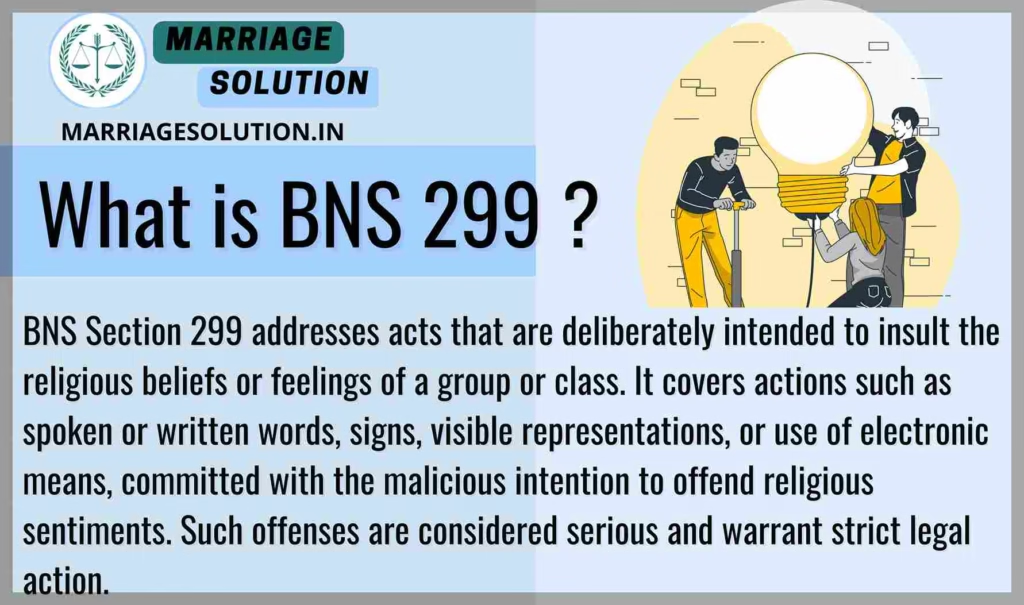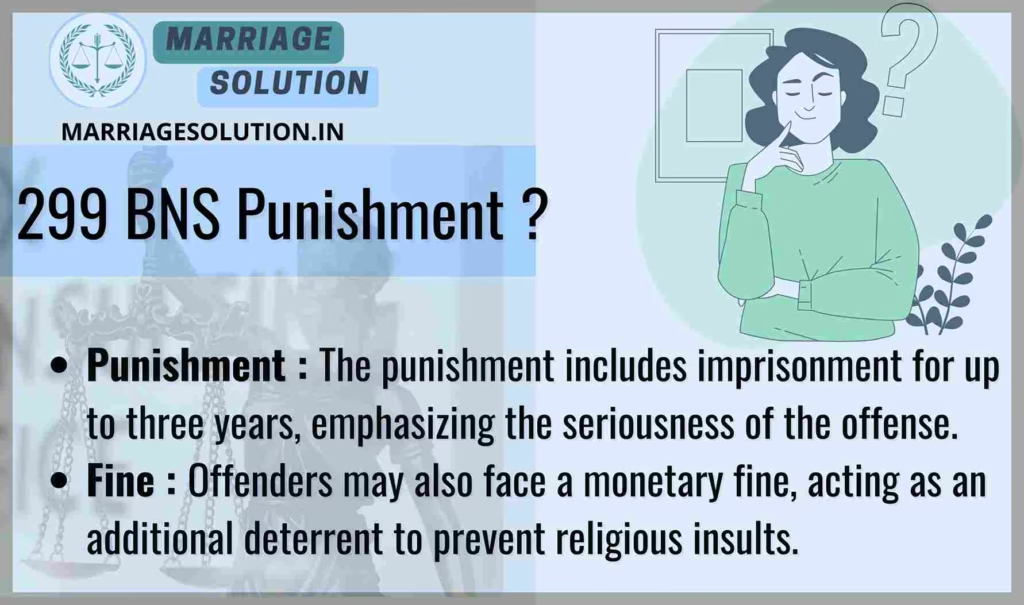Introduction of 299 BNS
299 BNS deals with deliberate and malicious acts intended to outrage the religious feelings of any class of people by insulting their religion or beliefs. This provision ensures that no individual or group uses words, writings, signs, or digital platforms to disrespect religious sentiments. By replacing IPC Section 295-A, BNS Section 299 modernizes the law to cover electronic communication while reinforcing India’s commitment to maintaining communal harmony and respect for all faiths.
The Bharatiya Nyaya Sanhita (BNS) Section 299 replaces the old Indian Penal Code (IPC) Section 295-A.
What is BNS Section 299 ?
BNS Section 299 addresses acts that are deliberately intended to insult the religious beliefs or feelings of a group or class. It covers actions such as spoken or written words, signs, visible representations, or use of electronic means, committed with the malicious intention to offend religious sentiments. Such offenses are considered serious and warrant strict legal action.

Under Section 299 of the bns act 2023
“Whoever, with deliberate and malicious intention of outraging the religious feelings of any class of citizens of India, by words, either spoken or written, by signs, by visible representations, or by use of electronic means, insults or attempts to insult the religion or religious beliefs of that class, shall be punished with imprisonment up to three years, or with fine, or with both.”
1. Meaning of Section 299
- This section punishes intentional and malicious acts meant to insult or outrage religious feelings.
- It covers spoken words, writings, signs, visual depictions, or electronic communications.
- The key elements are deliberate intention and malicious purpose to target religious beliefs.
- The aim is to protect communal harmony and respect among diverse faiths.
2. Who is Covered?
This section applies to:
- Individuals – Anyone making derogatory remarks about a religion.
- Publishers/Media Houses – Circulating offensive content against a community’s beliefs.
- Digital Users – Posting memes, edited visuals, or hate comments online against a religion.
- Organizers – Conducting events, rallies, or campaigns that target religious practices.
- Public Speakers – Delivering speeches with the intent to provoke or insult followers of a religion.
3. Nature of the Offence
- Cognizable → Police can arrest without prior approval of a magistrate.
- Non-Bailable → Bail is not a matter of right; it depends on the court’s discretion.
- Non-Compoundable → Cannot be privately settled; mandatory trial is required.
- Triable by → Magistrate of the First Class.
4. Examples of BNS Section 299
- Example 1 – Social Media Insult
A person posts derogatory cartoons mocking a religion’s deity with intent to provoke → Punishable under Section 299. - Example 2 – Hate Speech in Public
An individual delivers a speech targeting religious practices, knowing it will outrage followers → Covered under Section 299. - Example 3 – Offensive Digital Content
Someone circulates an edited video insulting sacred rituals on WhatsApp/Facebook → Offence under Section 299. - Example 4 – Malicious Publications
A magazine publishes articles ridiculing the beliefs of a religious community with malicious intent → Liable under this section.
5. Punishment under BNS Section 299
- Imprisonment → Up to 3 years.
- Fine → Monetary penalty imposed by the court.
- Both → Court may impose both imprisonment and fine, depending on severity.
6. Importance of BNS Section 299
- Prevents hate speech and malicious targeting of religions.
- Maintains public order and communal peace in a multi-religious nation.
- Protects freedom of religion from malicious abuse by individuals or groups.
- Reinforces that religious respect is a cornerstone of Indian law and society.
Section 299 BNS Overview
BNS Section 299 addresses deliberate and malicious acts intended to outrage the religious feelings of any class of citizens in India. It applies to insults through words, signs, representations, or electronic means that target the religion or religious beliefs of a group. The section ensures protection against such intentional offenses.
BNS Section 299 Explanation in 10 Key Points
- Acts with Deliberate Intention
Section 299 deals with actions committed with the purpose of offending or outraging the religious beliefs of a specific group. This section applies to those who intentionally engage in words or actions designed to provoke or insult a religion or its followers. The deliberate nature of the act is crucial to establish culpability under this law. - Use of Various Methods to Offend
Offenses under this section can take several forms, such as spoken or written words, gestures, visible depictions, or digital communications. Whether it involves public speeches, social media posts, or other forms of expression, the section covers any act that intentionally targets a group’s religious sentiments. - Targeting Religious Beliefs or Practices
This provision is intended to safeguard the religious beliefs and practices of all communities. It ensures that no group is subject to intentional harm or insult through offensive statements or actions against their religious traditions or values. - Seriousness of Outraging Sentiments
The section recognizes the emotional and social harm caused by acts that outrage religious sentiments. By punishing such offenses, it aims to deter individuals or groups from engaging in behavior that disrupts societal harmony and causes communal tensions. - Scope of Application
The section applies universally to protect all religions and their followers, ensuring that no particular faith is favored over another. It provides legal recourse for any group facing deliberate insults to their religious practices or beliefs. - Penalties Include Imprisonment
A person found guilty under this section can be sentenced to imprisonment for a term of up to three years. The punishment reflects the seriousness of such acts and their potential to harm societal peace. - Fine as a Punishment
In addition to imprisonment, offenders may also be required to pay a fine. The amount is determined based on the nature and gravity of the offense, acting as a financial deterrent against such behavior. - Combination of Penalties
Courts have the discretion to impose both imprisonment and a fine, depending on the circumstances of the case. This dual approach ensures that offenders face consequences that fit the severity of their actions. - Cognizable Offense
Offenses under Section 299 are classified as cognizable, allowing law enforcement agencies to take immediate action, including arrest, without prior judicial approval. This ensures swift response to acts that threaten public order. - Non-Bailable and Triable by Magistrate
The section is non-bailable, meaning bail is not guaranteed, and the decision rests with the court. The offense is tried by a Magistrate of the First Class, ensuring that experienced judicial authorities handle these sensitive cases.
Examples of BNS Section 299
- A person posts a digitally altered image mocking a sacred symbol of a religion on social media with the intention to offend followers of that religion.
- An individual organizes a public event where derogatory statements are made about a particular religion, knowing it will outrage the sentiments of the followers.
BNS 299 Punishment
Punishment
The punishment includes imprisonment for up to three years, emphasizing the seriousness of the offense.
Fine
Offenders may also face a monetary fine, acting as an additional deterrent to prevent religious insults.

BNS 299 bailable or not ?
BNS Section 299 is Non-Bailable, meaning that the accused cannot be granted bail as a matter of right. The court has the discretion to grant or deny bail based on the case’s facts.
Comparison: BNS Section 299 vs IPC Section 295-A
| Section | Offense | Punishment | Bailable / Non-Bailable | Cognizable / Non-Cognizable | Trial By |
|---|---|---|---|---|---|
| BNS Section 299 | Deliberate and malicious acts intended to outrage religious feelings of any class by insulting its religion or religious beliefs, through words, signs, representations, or electronic means. | Imprisonment up to 3 years, fine, or both. | Non-Bailable | Cognizable | Magistrate of the First Class |
| IPC Section 295-A | Deliberate and malicious acts intended to outrage religious feelings of any class by words, spoken or written, or by visible representations (older formulation; no mention of electronic means). | Imprisonment up to 3 years, fine, or both. | Non-Bailable | Cognizable | Magistrate of the First Class |
BNS Section 299 FAQs
What is the main aim of BNS Section 299?
The primary aim is to prevent individuals from deliberately insulting the religious beliefs or sentiments of any class of citizens in India, thereby preserving social harmony and protecting the sanctity of religion.
What types of acts are considered under this law?
The law covers acts such as spoken or written words, gestures, signs, visual representations, and electronic communications that are meant to insult or are likely to insult a religion or religious beliefs.
What punishment does the accused face under BNS Section 299?
An individual found guilty can face imprisonment of up to 3 years, a fine, or both, depending on the severity of the offense and the court’s judgment.
Is BNS Section 299 a cognizable offense?
Yes, this is a cognizable offense, meaning the police can arrest the accused without a warrant and begin an investigation immediately.
Can the accused be granted bail under BNS Section 299?
No, the offense is non-bailable, which means that the accused must seek approval from the court for bail, and it is not granted automatically.
Conclusion
BNS Section 299 plays a vital role in preserving religious harmony in a diverse nation like India. By penalizing deliberate insults to religious beliefs, it sends a strong message that freedom of speech cannot be misused to spread hate or provoke communities. The section not only safeguards faith and traditions but also ensures public order and peace. Understanding this provision helps citizens recognize the limits of lawful expression and the importance of respecting religious sentiments in a pluralistic society.
Need Legal Support?
If you are dealing with court cases, marriage problems, or any other legal issue, our team at Marriage Solution – Lawyer Help is here for you. Simply fill out our quick online enquiry form, and we’ll connect you with the right legal expert to support your needs.
Finished with BNS 299 ? Continue exploring the next provisions of the Bharatiya Nyaya Sanhita (BNS), 2023. Each section includes explanations, examples, and plain-language breakdowns for easy understanding.
- 300 BNS :Disturbing religious assembly.
- https://marriagesolution.in/bns_section/300-bns/
- 301 BNS :Trespassing on burial places, etc.
- https://marriagesolution.in/bns_section/301-bns/
- 302 BNS :Uttering words, etc., with deliberate intent to wound religious feelings of any person.
- https://marriagesolution.in/bns_section/302-bns/
CHAPTER XVII OF OFFENCES AGAINST PROPERTY.
- 303 BNS : Theft.
- https://marriagesolution.in/bns_section/303-bns/
- 304 BNS : Snatching.
- https://marriagesolution.in/bns_section/304-bns/
Full IPC Section List: https://marriagesolution.in/ipc-section-list
All Indian Law & Blogs: https://marriagesolution.in/indian-law/
Full BNSS Section List: https://marriagesolution.in/bnss_section-list
